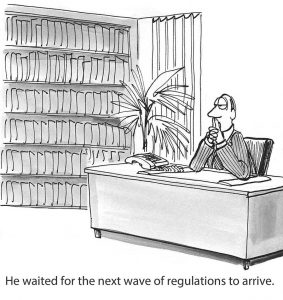 Never end a sentence with a preposition? That is the sort of pedantry up with which I shall not put. (Winston Churchill)
Never end a sentence with a preposition? That is the sort of pedantry up with which I shall not put. (Winston Churchill)
Sometimes it’s okay to savagely split an infinitive. (Me)
And if it sometimes seems right to start a sentence with ‘and’ or ‘but,’ do it.
Subject, predicate, object is almost always the right order. Until it gets boring.
Anglo-Saxon words make for sturdy, yeoman-like prose. The Romance words add, well, romance, even insouciance, but use them sparingly, n’est pas? (Strunk and White)
Strunk and White also banished the use of “however” at the beginning of a sentence. They preferred “nevertheless”. What a dumb opinion from such smart guys. However you look at it.
Elmore Leonard, who handed out some pretty good writing advice, said to never start a book with the weather. I wrote a book set in a beach town during the winter. When should I have alerted the reader that there was a blizzard outside?
Whom and shall are oft-neglected, beautiful words. For Who the Bell Tolls? You may eschew such seemingly atavistic usage, but I never shall.
My English teachers said to leave out the comma in front of the word ‘and’ in a set: do, re, mi, fa, sol, la, ti and do. And I’m sticking with it. I’m also putting commas in front of adverbs, no matter what some trendy copy editors advise, derisively.
I agree with Lewis Thomas that the least appreciated punctuation mark is the semi-colon; how this precious tool slipped into obscurity is anyone’s guess.
I also love his equating the exclamation mark with an annoying child who’s just interrupted an adult conversation. Mommy, my butt!
I can never remember if the period is supposed to go inside or outside parenthesis (which bugs the hell out of my stickler of a wife.).
She also taught me to read what I’ve written out loud. You’ll know right away if it sounds right or not. So listen up.
In the 18th century, they often used a letter called a “long s”, which looked like an “f”. This has confiderably confufed later generations. Proving that evolving our syntax and punctuation is often a good thing.
Advertising copy is the most anarchic form of the English language. Good. We couldn’t care less about complete sentences. Dumb assed things. Neither should you mystery writers.
Many formal, academic writers cannot, will not, bring themselves to use contractions. To their detriment. Americans, even smarty pants academics, won’t, don’t, couldn’t, shouldn’t, wouldn’t even think of speaking without them, so why leave them out of their writing? Ain’t that the truth.
A number in the narrative text can usually be rendered as a number. There were over 1,000 geese soiling my beautiful lawn. But when the character is actually speaking those words, I think it should be, “There were over a thousand geese soiling my beautiful lawn.”
Because, how do you say 1,000?
 Chris Knopf is an author of mysteries and thrillers, and a co-publisher at The Permanent Press.
Chris Knopf is an author of mysteries and thrillers, and a co-publisher at The Permanent Press.
